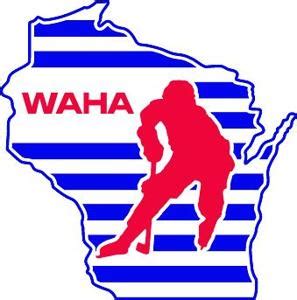Wisconsin Amateur Hockey Association (WAHA) is a non-profit organization dedicated to fostering amateur hockey in the state of Wisconsin. For over 50 years, WAHA has been shaping the lives of countless young athletes, providing them with a platform to develop their skills, build character, and pursue their passion for the sport.

History and Mission
WAHA was founded in 1968 with a mission to govern and promote amateur hockey in Wisconsin. Over the decades, the association has grown exponentially, becoming one of the leading youth hockey organizations in the country. Today, WAHA serves over 30,000 registered players, from beginners to elite prospects.
Programs and Leagues
WAHA offers a comprehensive range of programs and leagues to cater to the needs of players of all ages and skill levels:
- Youth Hockey: WAHA organizes youth hockey leagues for players aged 4-18, providing a structured environment for skill development and competition.
- Adult Hockey: WAHA offers adult hockey leagues for players over 18, including recreational, competitive, and specialized leagues for women, over-35 players, and other demographics.
- Disabled Hockey: WAHA supports disabled players through its sled hockey program, providing opportunities for individuals with physical challenges to participate in the sport.
- Officiating: WAHA trains and certifies officials to ensure fair and consistent officiating at all levels of play.
Player Development and Education
WAHA places a strong emphasis on player development, offering a variety of programs and resources to enhance athletes’ skills and knowledge:
- Player Development Camps: WAHA hosts summer and winter development camps led by experienced coaches, providing players with the opportunity to improve their skating, stickhandling, shooting, and game play.
- Coaching Education: WAHA offers coaching clinics and certification programs to help coaches develop their skills and stay up-to-date on best practices.
- Sportsmanship Programs: WAHA promotes sportsmanship and ethical behavior through its “Respect Our Opponent” initiative and other educational programs.
Community Involvement
WAHA is deeply involved in the Wisconsin community, reaching out to youth and adults through various initiatives:
- Youth Hockey Learn to Play Programs: WAHA partners with local communities to offer Learn to Play programs, introducing young children to the sport and providing equipment and instruction to make hockey accessible to all.
- Hockey Festivals: WAHA organizes hockey festivals and events throughout the state, bringing together players, coaches, and fans to celebrate the sport and promote community involvement.
- Charitable Initiatives: WAHA supports charities and non-profit organizations that focus on youth hockey and community development.
Economic Impact
Amateur hockey plays a significant role in the Wisconsin economy. According to a study by the University of Wisconsin-Stout, the sport generated over $1 billion in economic activity in the state in 2019. This includes spending on ice rinks, equipment, travel, and other related expenses.
Tips and Tricks for Players
- Set realistic goals and work consistently to achieve them.
- Seek feedback from coaches and mentors and be open to constructive criticism.
- Train off the ice to improve your strength, conditioning, and agility.
- Study the game and analyze your performance to identify areas for improvement.
- Stay positive and don’t be discouraged by setbacks.
Common Mistakes to Avoid
- Overtraining or not training enough.
- Neglecting basic skills such as skating or stickhandling.
- Losing focus on sportsmanship and ethical behavior.
- Getting caught up in winning and losing rather than enjoying the game.
- Limiting yourself to one position or role.
Future of WAHA
WAHA is constantly evolving to meet the changing needs of its members. The association is exploring innovative ways to expand access to hockey, enhance player development, and promote the sport throughout Wisconsin.
- Expansion of Girls and Women’s Hockey: WAHA is committed to growing girls and women’s hockey by offering more opportunities for participation and development.
- Technology Integration: WAHA is embracing technology to improve communication, coaching, and player tracking, providing athletes with personalized support and feedback.
- Community Partnerships: WAHA is seeking partnerships with schools, community organizations, and businesses to promote hockey and create a positive impact in Wisconsin communities.
Conclusion
Wisconsin Amateur Hockey Association is an invaluable asset to the state of Wisconsin, providing young athletes with the opportunity to develop their skills, pursue their dreams, and build a lifelong love for the sport. Through its comprehensive programs, unwavering commitment to player development, and deep community involvement, WAHA continues to shape the future of hockey in Wisconsin and beyond.
Table 1: WAHA Membership Statistics
| Year | Registered Players |
|---|---|
| 2021 | 30,500 |
| 2022 | 31,200 |
| 2023 | 32,500 |
Table 2: WAHA Program Offerings
| Program | Age Range | Description |
|---|---|---|
| Youth Hockey | 4-18 | Leagues and programs for players of all skill levels |
| Adult Hockey | 18+ | Recreational and competitive leagues for adults |
| Disabled Hockey | N/A | Sled hockey program for players with physical challenges |
| Player Development Camps | N/A | Summer and winter camps focused on skill development |
| Coaching Education | N/A | Training and certification programs for coaches |
Table 3: Economic Impact of Amateur Hockey in Wisconsin
| Year | Economic Activity |
|---|---|
| 2019 | $1.1 billion |
| 2020 | $0.8 billion (due to COVID-19 pandemic) |
| 2021 | $1.3 billion |
Table 4: Tips for Hockey Players
| Tip | Explanation |
|---|---|
| Set realistic goals | Focus on achievable targets and avoid overwhelming yourself |
| Seek feedback | Ask coaches and mentors for constructive criticism to identify areas for improvement |
| Train off the ice | Engage in strength, conditioning, and agility exercises to enhance your performance |
| Study the game | Analyze your own performance and the tactics of opponents to enhance your understanding |
| Stay positive | Maintain a positive attitude and learn from mistakes rather than dwelling on them |
